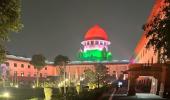State governments can directly approach the Supreme Court if the President withholds assent on a bill sent by a governor for consideration, the top court has said in a landmark verdict on a plea of Tamil Nadu alleging delay in grant of consent to bills passed by assembly.

A bench comprising justices J B Pardiwala and R Mahadevan on April 8 gave a huge relief to the Dravida Munnetra Kazhagam-led Tamil Nadu government and cleared 10 state bills which were stalled and reserved by Governor R N Ravi for President's consideration, and also set a timeline for all governors to act on the bills passed by state assemblies.
Justice Pardiwala, writing a 415-page judgement for the bench, dealt and delivered findings on the judicial review of the exercise of power by the Governor under Article 200 and by the President under Article 201 of the Constitution.
Article 200 deals with situations with regard to passage of bills by the state assembly and subsequent options available to the governor on grant of assent, or withholding of assent or sending the bill to the President for reconsideration.
Article 201 deals with the bills reserved for the President's consideration by the governor.
The court referred to various situations and held the actions of governors and the President regarding state legislation are subject to judicial scrutiny under certain circumstances.
"Where the Governor reserves a bill for the consideration of the President and the President in turn withholds assent thereto then, it shall be open to the State Government to assail such an action before this Court," the verdict said.
It emphasized that the constitutional powers vested in the Governor under Article 200 and in the President under Article 201 cannot be exercised arbitrarily or without accountability.
"Where the Governor reserves a bill for the consideration of the President in his own discretion and contrary to the aid and advice tendered to him by the State Council of Ministers, it shall be open to the State Government to assail such an action before the appropriate High Court or this Court," it said.
The bench then provided the grounds on which the state government can move the high courts.
"Where the reservation of a bill by the Governor for the consideration of the President is on the grounds of peril to democracy or democratic principles or on other exceptional grounds as mentioned in M.P. Special Police (supra) and Nabam Rebia (supra) then the Governor would be expected to make a specific and clear reference to the President properly indicating the reasons for entertaining such a belief by pinpointing the specific provisions in this regard and the consequent effect that may ensue if such a bill were to be allowed to become a law," the bench said.
The governor while making such a reference should also indicate his subjective satisfaction as to why the consequences that may ensue cannot be possibly curtailed or contained by taking recourse to the constitutional courts of the country, it said.
"It shall be open to the state Government to challenge such a reservation on the ground of failure on part of the Governor to furnish the necessary reasons as discussed aforesaid or that the reasons indicated are wholly irrelevant, mala-fide, arbitrary, unnecessary or motivated by extraneous considerations. This being a question completely capable of being determined by the constitutional courts, would be fully justiciable," the judgement said.
Reserving a bill on grounds such as "personal dissatisfaction of the Governor, political expediency or any other extraneous or irrelevant considerations" is strictly impermissible by the Constitution and would be liable to be set-aside forthwith on that ground alone, Justice Pardiwala said.
"Where a State bill has been reserved by the governor for the consideration of the President on the ground that assent of the President is required for the purpose of making the bill enforceable or securing some immunity therefor, then in such cases the withholding of assent by the President would be justiciable to the limited extent of exercise of such power in an arbitrary or mala fide manner. Owing to the political nature of the assent of the President in these categories of bills, the courts would impose a self-restraint," it said.
The bench said if a state bill is reserved by the governor for the consideration of the President on the ground that the bill appears to be patently unconstitutional, the withholding of assent would involve purely legal and constitutional questions and hence, be justiciable without any impediments imposed by the doctrine of political thicket.
"In such cases, it would be prudent for the President to obtain the advisory opinion of this court by way of a reference under Article 143 and act in accordance with the same to dispel any apprehensions of bias, arbitrariness or mala fides," it said.











 © 2025
© 2025